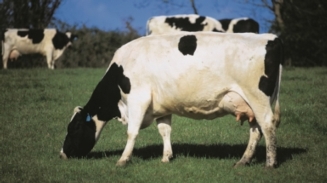
饲料添加物让动物少放屁
Feed Additive Squelches Ruminants' Methane Belches
饲料添加物让动物少放屁
A chemical compound can cut a cow's methane emissions by 30 percent—and help the animal get more energy from its food.
一种化合物可以使牛的甲烷排放量减少30%,并且帮助动物从食物中得到更多的能量。
撰文 克里斯多夫·因塔利亚塔(Christopher Intagliata)
翻译 陈旭琦
审校 李轩
The global population is now nearly seven and a half billion. And that’s just humans. Because our planet is also home to one-and-a-half-billion cows, another billion sheep, and a billion goats. Their combined belches account for a full fifth of the world's methane emissions—and methane is about 30 times more potent at trapping heat than CO2.。
全球人口已经接近75亿。不过这仅仅包括人类,我们的星球同样是1.5
亿头牛、1亿只绵羊以及1亿只山羊的家园。它们排放的甲烷占全球甲烷排放量的五分之一,而甲烷的保温能力比CO2高30%。
But those methane emissions might get cut—by feeding the grazers something called 3-nitrooxypropanol. "I can tell you, they like it. No rejection at all." Maik Kindermann, an organic chemist at DSM Nutritional Products in Switzerland. Liking it, in the cow world, he says basically means they'll still gobble up their food, even with this stuff mixed in.
但是这些甲烷量可以得到削减——通过对食草动物喂食一种被称为3-nitrooxypropanol的化合物。“我可以肯定地告诉你,它们非常喜欢这种化合物。”瑞士帝斯曼营养产品部(DSM Nutritional Products)的有机化学家迈克·金德曼(Maik Kindermann)如是说。他说,对于牛而言,“喜欢”大部分情况下意味着即使食物里掺有这种东西,它们仍然会狼吞虎咽。
Kindermann's company developed the additive a few years back. It jams up an enzyme crucial to the production of methane by microbes that live inside the animals. And it only targets those methane-belching microbes, while leaving the rest of the microbiome untouched. The result? A 30 percent decrease in methane emissions. The study is in the Proceedings of the National Academy of Sciences. [Evert C. Duin et al: Mode of action uncovered for the specific reduction of methane emissions from ruminants by the small molecule 3-nitrooxypropanol]
金德曼的公司在几年之前就研发出了这种添加物。它会抑制动物体内的一种酶,而这种酶对细菌生成甲烷非常重要。并且它只将与甲烷排放有关的微生物作为目标,不影响其它的微生物。结果呢?甲烷的排放减少了30%!这项研究正由美国国家科学院(National Academy of Sciences)进行。
Kindermann says he thinks the compound could be a win-win for the planet—and the animals. "You know the methane is kind of a waste product. And this energy, instead of losing it for the animal, it can be reused for the animal in terms of performance, and at the same time we are doing something for greenhouse gas emission and climate change." The product’s not on the market yet—toxicology tests are ongoing. But the hope is that it might take some of the heat off of beef.
金德曼认为这种化合物可以为地球和动物创造共赢。“众所周知,甲烷是一种排泄物。从性能角度看,这些能量应被动物重复使用,而不是浪费它。同时我们也是在为温室气体排放和气候变化作出努力。”不过,这一产品还未上市——毒性测试正在进行。但是希望它能够减少牛肉的热量。
未经书面许可任何人不得复制或镜像
京ICP备11000850号-1
 京公网安备11010502039775号
京公网安备11010502039775号 信息网络传播视听节目许可证0111611号
国家科技基础条件平台

















